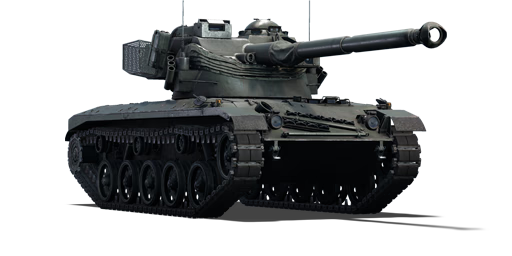

Ground Vehicles
SK-105A2
VI
Rank
AB
8.7
RB
8.7
SB
8.7
Battle rating
France
Game nation
Light tank
Main role
94,000

Research
520,000

Purchase

Austria
Operator country
General information
Introduced in Update "Ixwa Strike", the SK-105 Kürassier A2 shines as a long-range sniper due to its powerful 105 mm CN105G1 tank gun, low profile, and high mobility. Players ought to constantly check their surroundings for potential danger. An excellent strategy is to find an elevated position with a cover nearby. Rushing to the major battle zones should be avoided in general, and tactics such as flanking or sniping should be prioritized, as the SK-105 Kürassier A2 has little chance of winning in direct confrontations or close-quarter engagements. Along with its powerful primary armament, the 4-second autoloader will be an enormous advantage that should be exploited during combat.
Camouflages:
Survivability and armour
Armour
front / side / back
Hull
20 / 14 / 12 mm
Turret
40 / 20 / 20 mm
Visibility
88 %
Crew
3 persons
Support systems
Mobility
Max speed
Forward
6875 km/h
Backward
89 km/h
Power-to-weight ratio
17.815.733.927.6 hp/t
Engine power
320283611496 hp
Weight
18 t
Optics
Gunner
Commander
Driver
Optics zoom
6.8x–8.0x
1.6x–7.5x
—
Optical device
Armaments
105 mm PzK M57 cannon
Ammunition
42 rounds
First-order
12 rounds
Reload
4 s
Vertical guidance
-6 / 13°
Turret Rotation Speed
basic crew → aces
Horizontal
2117.939.528.6 → 3025.556.540.8 °/s
Vertical
75.624.515.7 → 1083522.4 °/s
| Ammunition | Type | Armor penetration (mm) at a distance: | |||||
|---|---|---|---|---|---|---|---|
| 10 m | 100 m | 500 m | 1000 m | 1500 m | 2000 m | ||
| HEAT | 400 | 400 | 400 | 400 | 400 | 400 | |
| HE | 25 | 25 | 25 | 25 | 25 | 25 | |
| APFSDS | 346 | 344 | 335 | 326 | 315 | 306 | |
| Smoke | 3 | 3 | 3 | 3 | 3 | 3 | |
7.62 mm MG3A1 machine gun (coaxial)
Ammunition
2,000 rounds
Belt capacity
200 rounds
Reload
basic crew → aces
10.4 → 8 s
Fire rate
1,200 shots/min
| Belt | Belt filling | Armor penetration (mm) at a distance: | |||||
|---|---|---|---|---|---|---|---|
| 10 m | 100 m | 500 m | 1000 m | 1500 m | 2000 m | ||
| AP/T | 13 | 12 | 7 | 3 | 2 | 0 | |
Economy
Repair cost
Basic → Reference
AB
3,215 → 5,382 

RB
3,439 → 5,757 

SB
4,117 → 6,892 

Crew training
150,000 

Experts
520,000 

Aces
2,100 

Research Aces
950,000 

Reward multiplier
AB / RB / SB
130 / 170 / 210 % 

220 % 

Total cost of modifications
157,700 

260,400 

Talisman cost
2,600 

Research order:
Mobility | |
|---|---|
Protection |
|---|
Firepower | ||
|---|---|---|
Rating by players
You must play more than 3 battles for the last week and more than 10 battles in a vehicle to rate it.
Like:
6
Armor protection:
Not enough ratings
Survivability:
Not enough ratings
Mobility:
Not enough ratings
Armament:
Not enough ratings
Balance:
Not enough ratings
Articles
No articles about this vehicle yet
Become the first author and get rewards!
Write a guide, tell about interesting historical facts, make a tutorial or simply an interesting post.
No more content